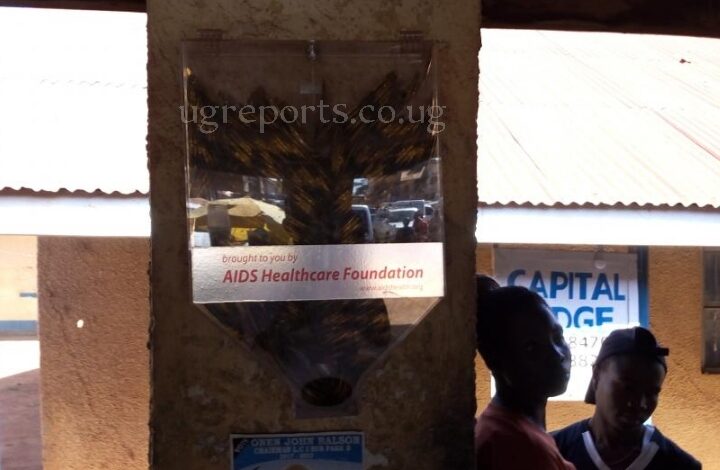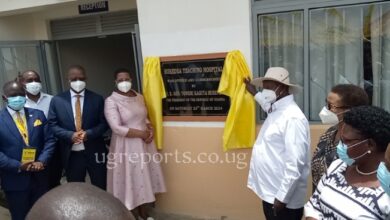Government tasked to establish public condom pick-up points
Most men are shy about buying condoms from clinics, and those who have money but are not courageous have been forced to have extramarital affairs without protection.

By Our Reporter
Bunyoro: The government of Uganda, through the Ministry of Health, has been asked to introduce public condom pick-up points.
The call comes at a time when the country commemorated the International Condom Day held in Lyantonde District on Tuesday.
Marked annually, International Condom Day is a global advocacy and awareness day to promote the use of condoms as a means of preventing the spread of sexually transmitted infections (STIs), including HIV, and unplanned pregnancies.
Mr. John Tuhaise, a resident of Kikwanana Cell in Nyanghya Division Masindi Municipality, notes that if the public condom pick-up points are introduced, they will be able to pick up the condoms at any time they wish, even at night.
He stresses that, as men, they fear buying condoms in public places like drug shops and pharmacies, even at night, due to a lack of privacy.
”It’s hard for us men to buy condoms in public places like drug shops, clinics and pharmacies; at least if they introduce public pick-up points, we can even pick them up during night hours,’’ he suggested.
Mr. Johnson Tumusiime, a resident of Kirasa Cell, notes that due to a lack of public condom pick-up points, those who are not courageous enough or don’t have money to buy from private clinics are forced to have extramarital affairs without protection.
‘’Most men are shy about buying condoms from clinics, and those who have money but are not courageous have been forced to have extramarital affairs without protection.’’
Mr. James Wamani, a resident, challenges the health ministry to sensitize the public on the proper usage of condoms, stressing that some men, mostly those who use them, don’t know how to use them.
‘’Some men, mostly the youth, don’t know how to use condoms; I think it’s one of the areas the ministry of health should tackle.’’
Ms. Joan Mbabazi asks the government to increase the size of the condoms, stressing that in most cases, they burst during extramarital affairs, exposing them to diseases.
Prudent Tayebwa, the Bunyoro Regional Manager for Productive Health, stresses that though condoms are at the forefront of fighting the spread of the deadly HIV virus, most people don’t know how to use them properly.
Tayebwa also notes that though they have pick-up points at most government health centers, people have not made use of the points due to fear and shyness.
She observed, however, that all condoms are fit, refuting the issue of condoms being of small sizes.
During the commemoration of International Condom Day in Lyantonde District, Henry Magala, the Country Director of Uganda Cares, emphasized the critical importance of condom distribution in HIV prevention efforts.
Magala highlighted the urgent need for increased government funding to support the procurement and distribution of condoms across Uganda.
Available data shows that of the youth aged between 25 and 29 in Uganda, 38% do use condoms, and among women aged 24–25, the condom use is too low.
The World Health Organization (WHO) indicates that unprotected sexual intercourse between males and females is a predominant mode of HIV transmission among partners whose status is unknown.
About 1.4 million people are living with HIV in the country, with 43% of new HIV infections occurring in the country.
Last year, AIDS Healthcare Foundation (AHF) country director Henry Magala said that if Ugandans emphasized prevention, 70% of the diseases would be prevented.
According to the AIDS 8th review in 2021, there were 53,000 new infections, and sex accounts for 80% of the HIV infections and other STDs.
Magala notes that if the above people had used condoms correctly and consistently, 42,000 new infections would have been averted if the programming was right and condoms were available.
Currently, HIV prevalence is highest in the Central region (10.4%) due to its urbanization and the location of the capital city, Kampala, which is home to 1.5 million people.
The discovery that AIDS was a sexually transmitted disease and that the only way to protect against it was through barrier methods led to the biggest spike in condom usage the world has ever seen.
According to the World Health Organization, condoms, when used correctly and consistently, are safe and highly effective in preventing the transmission of sexually transmitted infections, including HIV, and unplanned pregnancies.
Condoms are safe, inexpensive, and widely available.
There are both external (male) and internal (female) condoms, which are effective when used correctly.
Do you have a story about your community or an opinion to share with us? Email us at theugreports@gmail.com.






